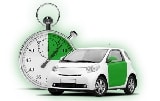How to Finance a Pre-Owned Vehicle
 After you've bought a pre-owned vehicle, the next task you will face is paying for it.
After you've bought a pre-owned vehicle, the next task you will face is paying for it.
For hundreds of customers who have no cash lying around to afford to pay for a vehicle there is an option of financing. Taking a loan for pre-owned car, you'll get a chance to pay it off quickly just with monthly installments at a low interest rate. The loan will definitely make your bottom line bigger, though it will be of great use in keeping up with your bills for a new car. Below you can find a few tips how to secure car financing.
Choose a Lender
Buying a car from the dealership you will definitely get a financing offer through one of the affiliates of this company. In the reality these dealer-sponsored loans can't be beaten. You need to secure financing just the day you buy the vehicle and simply drive home being its legal owner. This option suits perfectly those customers who would not normally get a loan, as they are secured by the dealer, not by the car owner.However, you will have to pay for this convenience. Such dealer-sponsored loans usually have higher interest rates in comparison with other counterparts. The only recommendation for you is to look for a safer and more reliable lender to work with if you do not want to get extra charges with time. As a rule, the best interest rates are offered by credit unions and local banks, so you can try to set an appointment with them and learn all the details. Your credit score will be taken into account as well as the make of the car, model and VIN number. Ask about the offers they are ready to make and compare all of the propositions you have. Choose the cheapest and the most suitable one. You should not be afraid of telling the loan officer about the competition, as they also tend to reduce prices in such cases.
Still, the interest rates on pre-owned car loans are commonly higher than those for new car.
 NOTE: The majority of dealerships require a qualification letter from the lender just before you take the loan. You can take this letter from your loan officer as it proves your financial eligibility to pay for the vehicle. It's a great idea to opt for a lender and receive one of these letters beforehand. It will help you drive your car off straight the moment you do all the paperwork.
NOTE: The majority of dealerships require a qualification letter from the lender just before you take the loan. You can take this letter from your loan officer as it proves your financial eligibility to pay for the vehicle. It's a great idea to opt for a lender and receive one of these letters beforehand. It will help you drive your car off straight the moment you do all the paperwork.
Set the Terms of the Loan
Once you know your lender, you have to specify the terms of your loan together. These features include setting down the terms of your loan, its amount and details of monthly payment. Nevertheless, down payments for pre-owned cars are not indispensable, and it will still be a good option. The most general advice is to pay at least 10% of the price upfront in order to help offset the amount of money you will spend on the car during the first year of its ownership. However, this sum is just a recommended one; you can increase or lower it. In reality the bigger the first coverage you make, the more beneficial it is, as you get a chance to save some money afterwards.When you have solved all the questions with the down payment, move on to the duration of the loan. This will also settle monthly payments. Usually vehicle loans should be paid off within three or five years. If it is possible, reduce the term to three years, because even having higher monthly payments you will also save money on the interest rates.
The most important thing is for your vehicle expenses not to exceed 20% of your income. This should include insurance, fuel and loan payment. This disposable income is the money that you still have after paying all the other monthly bills. If a three-year loan is difficult for you and it will set you in boarders, take the five-year term instead. Stability is a primary concern.